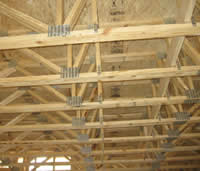|
Home Design Custom Search Two-Story Homes Cost Less A two-story home uses fewer materials for the same square footage. Example, a ranch home, with all of the finished area on one floor, the roof & foundation would have to be large enough to cover the entire 2,000 feet of living space. Turn that single level ranch into a two-story home and the roof size is instantly reduced by 50 percent because the second floor system became the "roof" for half of the area on the first floor and the foundation is now half the size of the ranch. Therefore, the two-story is saving material/labor costs on the foundation & roofing. Floor and wall area remains about the same for the one-story & two-story homes. Of course, this example is oversimplified because it doesn’t consider any other differences like the need to add the cost of stairs and take away the space they occupy, or in the case of a slab-on-grade foundation, the difference between the cost of a concrete slab verses a wooden floor system, but hopefully the point has been made. Shape of Home Homes that have a square or rectangular shape are less expensive to build. Having more angles and corners in the shape of your home increasing the amount of labor and materials needed to build a home. Curves & round shapes in the design can be very expensive compared to straight lines and 90-degree angles. Dome shaped homes also make efficient use of materials and can cost less than other shapes.
Size of Home When building a home it's best to work with even numbers and have your home size rounded up or down to increments of 4 feet. This reduces wasted materials since most building materials increase in size by 2 feet increments & most sheet materials come in 4x8 sizes and the maximum length of stock lumber is 16 feet. Also, it's preferable to have the depth of your home be 32 feet deep or less. If you go over 32 feet depth, then your roof trusses may need to be specially designed and will be a little more expensive. Square Footage Cost of Small Homes Versus Large Homes When determining a square footage cost estimate, it's important to use homes that are similar is size and quality to what you want to build. The cost per square foot is often higher for a small home when compared to the cost per square foot a larger home. A larger home may cost less per square foot than a smaller home, since the price of most of the expensive parts (the kitchen, the plumbing, the heating and cooling systems) is spread out over a larger area. Foundations The type of foundation can affect the cost. Concrete slab homes are the least expensive, crawlspace homes with a wooden floor system adds additional cost and basement homes would be the most expensive option. Also, depending on your region, the footing depth can increase the cost due to the soil frost line, in the south, 6 inches is usually sufficient and up north, it can be as deep as 60 inches.
Roof The more roof angles or the steeper your roof pitch is, then the greater the cost the roof will have, however steeper pitch roofs do last longer and are less likely to leak. Materials The materials you choose can have a big impact on the price of the home. In general it costs less to use materials that are readily available in your area. Keep in mind, that expensive does not always mean high quality.
|
Building Tip
"Consider using floor trusses for your floor system. They are strong and provide easy access for running ducts, piping, wires, etc. However it is critical they be installed properly and they cannot be modified in any way."

Download the installation instructions for the floor trusses to familiarized yourself with their instructions.
INSPIRING THOUGHT
"The block of granite, which was an obstacle in the path of the weak, becomes a stepping-stone in the path of the strong."
~ Thomas Carlysle
